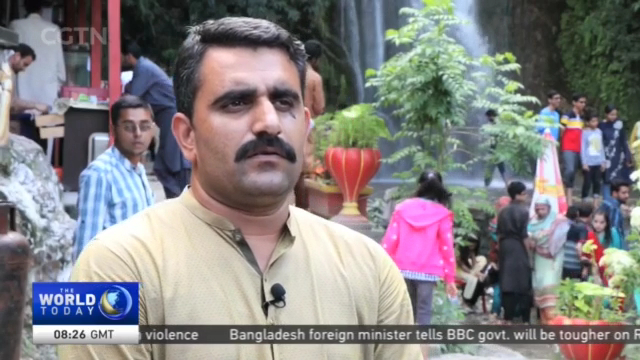
17:14, 25-Aug-2019
Kashmir Situation: India's revocation of region's autonomy impacts tourism
Updated
17:36, 25-Aug-2019

Despite conflicts and instability, tourism remains an important part of Kashmir's economy. But since India's revocation of Kashmir's special status, business has slowed down. Our correspondent Danial Khan finds out how the situation along the line of control is affecting tourism in Pakistani-controlled Kashmir.
"If there is ever a heaven on earth, it's here in Kashmir", are the famous words of Mughal Emperor Jehangir.
Kashmir is blessed with all the virtues, travelers obsess over: snow-capped peaks, dense pine forests, meadows, waterfalls and gushing rivers.
SYED ISHTIAQ AHMED GILLANI TOURIST POLICE, AZAD KASHMIR "We get a lot of local and foreign tourists, especially to the Neelum Valley and Muzaffarabad, Rawalakot, Panjosan and Tolipir. Hundreds of thousands come here."
But, it is also a land of endless instability and uncertainty, owing to its status: a disputed territory.
There is a looming security threat along the border, and people, especially tourists fear the situation can escalate at any moment.
DANIAL KHAN AZAD KASHMIR, PAKISTAN "Tourism was the backbone of Kashmir's economy. Hundreds of thousands of local and foreign tourists used to come here, to witness its landscapes and natural beauty. But since the escalation at the line of control and frequent ceasefire violations from the Indian side, authorities say the tourism sector has been badly hit."
Such uncertainty is, unfortunately, far from uncommon in Kashmir. The latest tensions simmering in the valley have brought Pakistan and India to the brink of war.
KHALID MAHMOOD DIRECTOR, TOURISM & ARCHEOLOGY, AZAD KASHMIR "Ever since India has started violating the ceasefire, it has greatly affected our tourism industry negatively. Especially the Neelum Valley where the tourist spots are very near to the LOC, they fired at those spots and injured the people there. They even fired cluster toy bombs in that area. Several children got injured."
An increased militarization of the Kashmir Valley by Indian armed forces, and unrest has taken a heavy toll on tourism.
TAUSEEF ISMAIL HOTEL OWNER "We used to have thousands of tourists here, but ever since the special status of Kashmir has been changed, and violence has begun at the LOC, tourism has gone down, the Kashmir government had announced 2019 as the year of tourism, but no one is coming here because of the tense situation. 90 percent of our business has been affected."
Much of the local population is involved with tourism, whether directly through hotels, restaurants, and transportation, or indirectly through sales of supplies to businesses or handicrafts to visitors.
QASID LOCAL TOUR GUIDE "The situation at the LOC has had a negative impact on tourists, where a thousand tourists were coming here in the past, now not even a hundred come. It is hurting our economy."
ZAIN KHOKHAR RESIDENT OF MUZAFFARABAD "The local population depends on tourism, and right now as far as the Kashmir issue is concerned and the brutality India has shown, the local population is adversely affected."
In better days, Azad Kashmir sees around 2 to 3 million tourists a year, but whenever turmoil surges, as it is now, livelihoods are impacted. For now, the percentage of the tourists stands at between 2 to 3. Hotels and guesthouses lie vacant.
KHALID MAHMOOD DIRECTOR, TOURISM & ARCHEOLOGY "We went as far as giving out hotels and guest houses free for 3 days to tourists who were traveling here. But when the hype that was created in the media about the border areas, people cancelled their trips."
As tensions simmer between the two nuclear-armed neighbors, residents of Kashmir fear the situation might escalate any time. They remain uncertain about their future and livelihood. Danial Khan, CGTN, Azad Kashmir, Pakistan.
SITEMAP
Copyright © 2018 CGTN. Beijing ICP prepared NO.16065310-3
Copyright © 2018 CGTN. Beijing ICP prepared NO.16065310-3